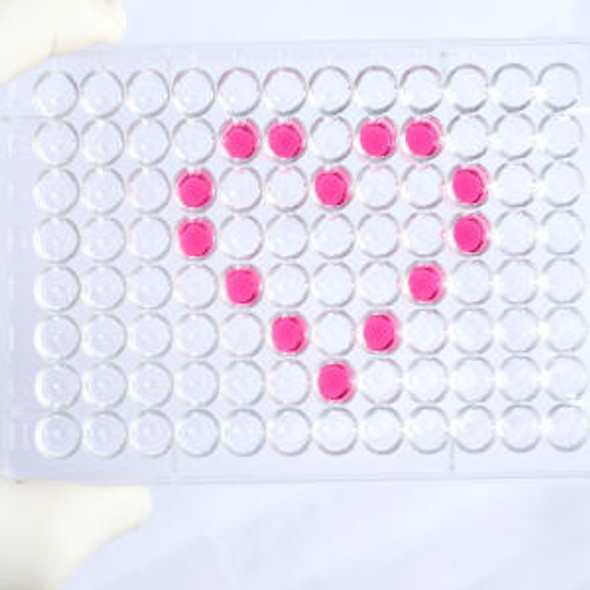Cell Biology Antibodies 15
Anti-OXTR Antibody (CAB18686)
- SKU:
- CAB18686
- Product Type:
- Antibody
- Reactivity:
- Mouse
- Host Species:
- Rabbit
- Isotype:
- IgG
- Research Area:
- Cell Biology
Description
| Antibody Name: | Anti-OXTR Antibody |
| Antibody SKU: | CAB18686 |
| Antibody Size: | 20uL, 50uL, 100uL |
| Application: | IF |
| Reactivity: | Mouse |
| Host Species: | Rabbit |
| Immunogen: | Recombinant protein of human OXTR. |
| Application: | IF |
| Recommended Dilution: | IF 1:50 - 1:200 |
| Reactivity: | Mouse |
| Positive Samples: |
| Immunogen: | Recombinant protein of human OXTR. |
| Purification Method: | Affinity purification |
| Storage Buffer: | Store at -20°C. Avoid freeze / thaw cycles. Buffer: PBS with 0.02% sodium azide, 50% glycerol, pH7.3. |
| Isotype: | IgG |
| Sequence: | Email for sequence |
| Gene ID: | 5021 |
| Uniprot: | P30559 |
| Cellular Location: | |
| Calculated MW: | |
| Observed MW: | Refer to figures |
| Synonyms: | |
| Background: |
| UniProt Protein Function: | OXTR: Receptor for oxytocin. The activity of this receptor is mediated by G proteins which activate a phosphatidylinositol- calcium second messenger system. Belongs to the G-protein coupled receptor 1 family. Vasopressin/oxytocin receptor subfamily. |
| UniProt Protein Details: | Protein type:Membrane protein, multi-pass; GPCR, family 1; Receptor, GPCR; Membrane protein, integral Chromosomal Location of Human Ortholog: 3p25 Cellular Component: microvillus; cell-cell adherens junction; integral to plasma membrane; apical plasma membrane; plasma membrane Molecular Function:oxytocin receptor activity; peptide hormone binding; peptide binding; vasopressin receptor activity Biological Process: lactation; response to peptide hormone stimulus; response to anoxia; heart development; female pregnancy; positive regulation of synaptic transmission, glutamatergic; response to estradiol stimulus; elevation of cytosolic calcium ion concentration; cell surface receptor linked signal transduction; muscle contraction; response to drug; maternal behavior; eating behavior; response to amphetamine; positive regulation of synaptic transmission, GABAergic; social behavior; response to cocaine; sleep; memory; cellular response to hormone stimulus; G-protein coupled receptor protein signaling pathway; positive regulation of synaptogenesis; telencephalon development; regulation of systemic arterial blood pressure by vasopressin; suckling behavior; gut development; response to cytokine stimulus; maternal process involved in parturition; positive regulation of vasoconstriction; sperm ejaculation; response to progesterone stimulus; positive regulation of blood pressure |
| NCBI Summary: | The protein encoded by this gene belongs to the G-protein coupled receptor family and acts as a receptor for oxytocin. Its activity is mediated by G proteins which activate a phosphatidylinositol-calcium second messenger system. The oxytocin-oxytocin receptor system plays an important role in the uterus during parturition. [provided by RefSeq, Jul 2008] |
| UniProt Code: | P30559 |
| NCBI GenInfo Identifier: | 32307152 |
| NCBI Gene ID: | 5021 |
| NCBI Accession: | NP_000907.2 |
| UniProt Secondary Accession: | P30559,Q15071, |
| UniProt Related Accession: | P30559 |
| Molecular Weight: | 42,772 Da |
| NCBI Full Name: | oxytocin receptor |
| NCBI Synonym Full Names: | oxytocin receptor |
| NCBI Official Symbol: | OXTR |
| NCBI Official Synonym Symbols: | OT-R |
| NCBI Protein Information: | oxytocin receptor |
| UniProt Protein Name: | Oxytocin receptor |
| Protein Family: | Oxytocin receptor |
| UniProt Gene Name: | OXTR |
| UniProt Entry Name: | OXYR_HUMAN |






